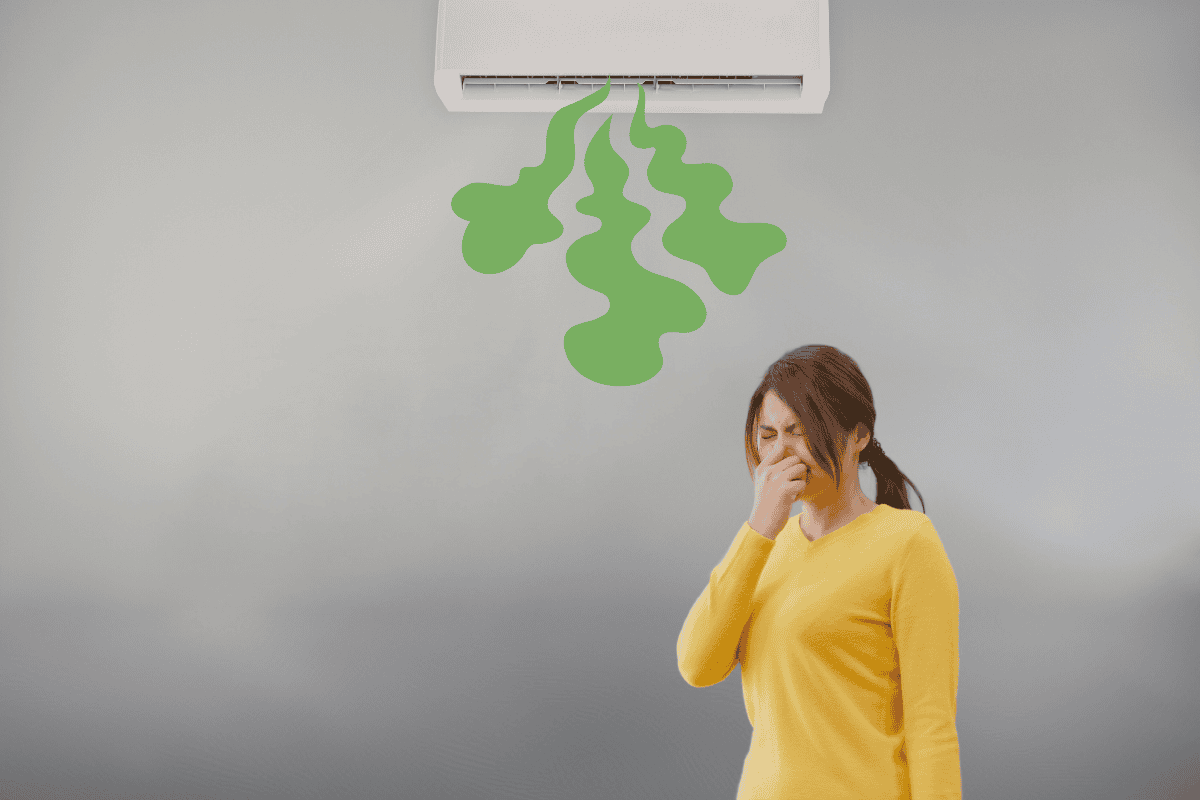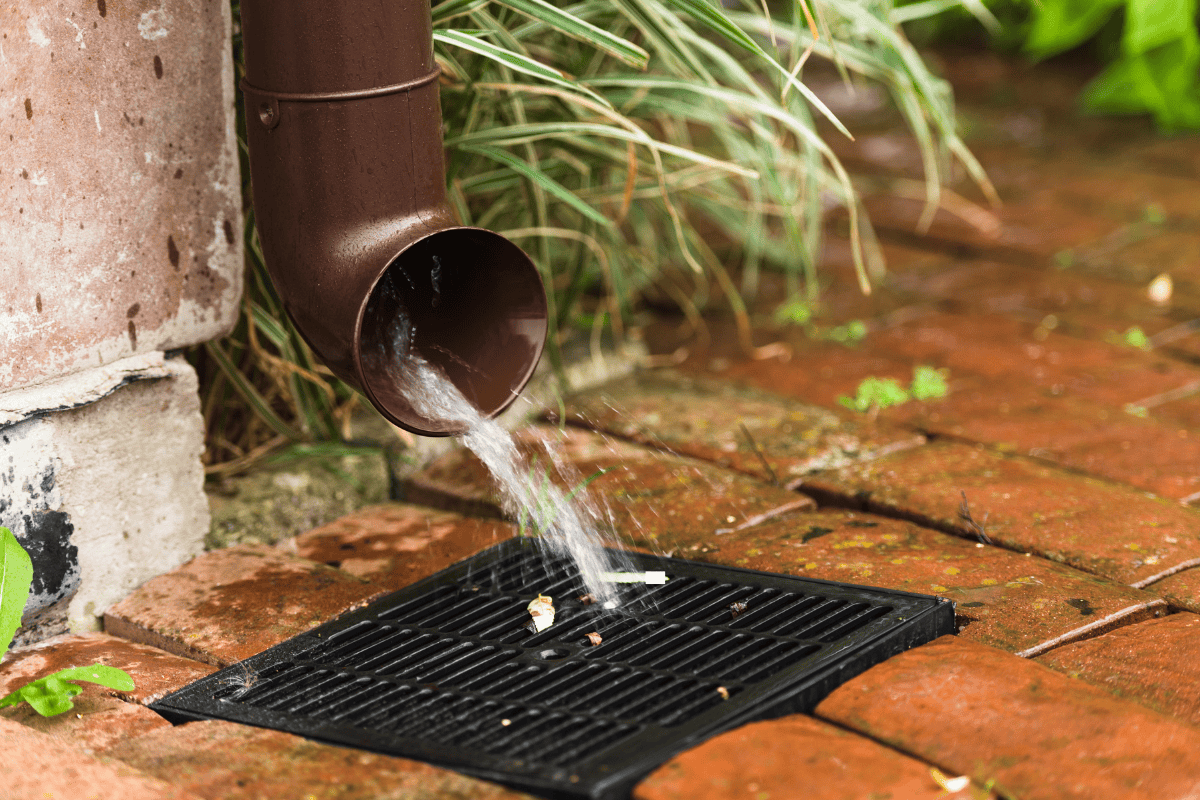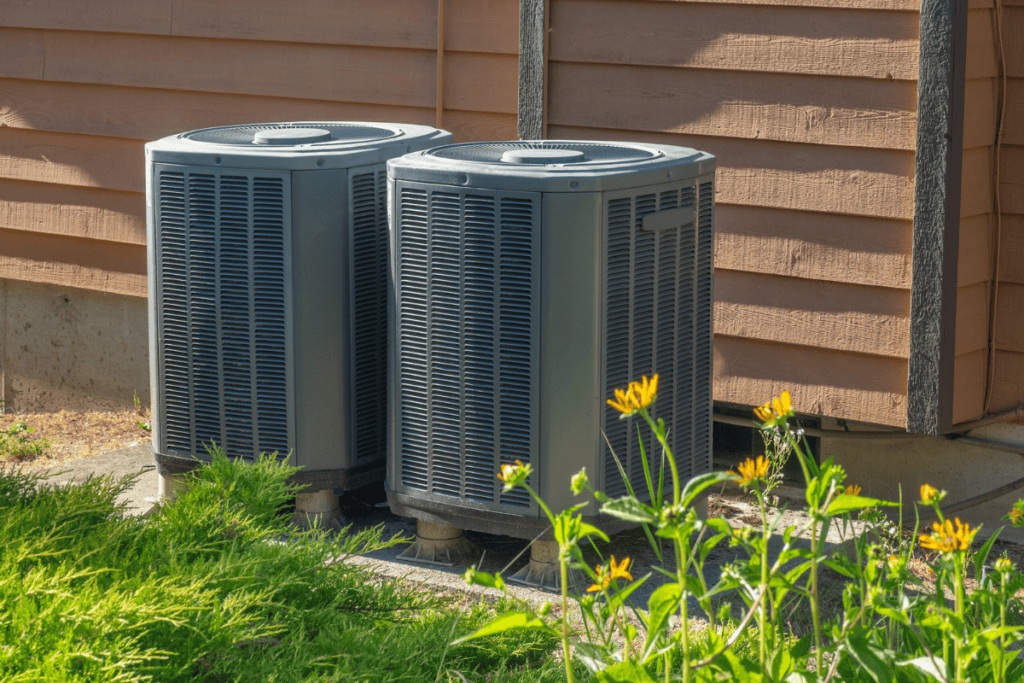When you turn on your air conditioner, you expect a refreshing burst of cool, clean air. However, sometimes your AC may emit unpleasant odors that can quickly spread throughout your home. These smells can be more than just a nuisance; they often indicate underlying issues within your air conditioning system.
Identifying and understanding the different types of smells that can come from your air conditioner helps in maintaining a healthy and comfortable indoor environment. In this article, we’ll discuss 7 common AC smells, their potential causes, and the steps you can take to address and prevent these problems.
By familiarizing yourself with these odors, you’ll be better equipped to identify and resolve issues with your unit, so that your home remains a pleasant and inviting space.
Contents
- 1 Types of AC Smells and Their Causes
- 1.1 1. Why Does My Air Conditioner Have a Musty or Moldy Smell?
- 1.2 2. Why Does My Air Conditioner Have a Rotten Egg Smell?
- 1.3 3. Why Does My Air Conditioner Have a Burning Smell?
- 1.4 4. Why Does My Air Conditioner Have a Chemical Smell?
- 1.5 5. Why Does My Air Conditioner Have a Sewage Smell?
- 1.6 6. Why Does My Air Conditioner Have a Gas Smell?
- 1.7 7. Why Does My Air Conditioner Have a Feet or Dirty Socks Smell?
- 2 Can’t Get Rid of Bad Smell From AC? Call HVAC Angel
- 3 Frequently Asked Questions
- 3.1 1. Is bad AC smell harmful?
- 3.2 2. How often should I have my air conditioner serviced to prevent bad smells?
- 3.3 3. Can pets contribute to bad smells in my air conditioner?
- 3.4 4. Should I turn my AC off if it smells?
- 3.5 5. Can a new air conditioner emit foul smells?
- 3.6 6. Can seasonal changes affect the smell of my air conditioner?
Types of AC Smells and Their Causes
1. Why Does My Air Conditioner Have a Musty or Moldy Smell?
A musty or moldy smell coming from your air conditioner is a common issue that indicates the presence of mold or mildew in your AC unit. This unpleasant odor can quickly spread throughout your home, making it uncomfortable and unhealthy to breathe. Mold and mildew thrive in damp, dark environments, and your air conditioning system can provide the perfect conditions for their growth.
Common causes of mold and mildew growth in air conditioners include:
- Accumulation of moisture: When your unit cools the air, it also removes humidity. If the moisture isn’t properly drained or the evaporator coils remain wet, it can lead to mold and mildew growth.
- Clogged or dirty air filters: Air filters trap dust, dirt, and other particles. When they become clogged, they can restrict airflow and cause moisture to build up in the system, promoting mold growth.
- Poor drainage: If the drain pan or condensate line becomes clogged, water can accumulate and stagnate, creating an ideal environment for mold and mildew.
- High humidity levels: In regions with high humidity, the excess moisture in the air can contribute to mold growth within the system.
Inhaling mold spores can trigger asthma symptoms, including shortness of breath, wheezing, or coughing in people with known allergies. Mold exposure can also cause other respiratory issues and allergic reactions, making it essential to address the problem promptly.
2. Why Does My Air Conditioner Have a Rotten Egg Smell?
If you notice a rotten egg smell coming from your air conditioner when you first turn it on, it may indicate the presence of a dead animal inside the unit or ductwork.
Small animals like rodents, birds, or reptiles can sometimes find their way into your HVAC system through gaps or openings in the ducts, seeking shelter or warmth. If these animals get trapped and die, their decomposing bodies can create a strong, rotten egg-like smell that permeates the air when your AC is running.
Common causes of animals entering your air conditioning unit or ducts include:
- Gaps or holes in the ductwork: Over time, ducts can develop cracks or separations that allow small animals to get inside.
- Lack of proper sealing: If the entry points to your HVAC system are not properly sealed, animals may find their way in.
- Infrequent inspections: Regular maintenance and inspections can help identify potential entry points and prevent animals from getting trapped in your system.
3. Why Does My Air Conditioner Have a Burning Smell?
If you notice a burning smell coming from your air conditioner when you first turn it on, it could indicate several issues related to electrical components, wiring, or mechanical failures. This odor can be alarming and may require immediate attention to prevent further damage to your unit or potential safety hazards.
Common causes of a burning smell in air conditioners include:
- Overheating electrical components: If electrical parts such as capacitors, relays, or motors are subjected to excessive heat, they can emit a burning smell. This may be due to age, wear and tear, or a lack of proper maintenance.
- Dust or debris burning off: When you first turn on your air conditioner after a long period of inactivity, accumulated dust and debris on the heating elements or coils can burn off, producing a temporary burning smell.
- Faulty wiring or connections: Loose, frayed, or damaged wiring within your unit can cause electrical shorts or overheating, leading to a burning odor.
- Worn-out motor or other mechanical parts: As motors, belts, or other moving components in your air conditioner age and deteriorate, they can generate excessive heat and produce a burning smell, indicating the need for replacement.
4. Why Does My Air Conditioner Have a Chemical Smell?
If you notice a chemical smell coming from your air conditioner, it could be a sign of a refrigerant leak or the presence of volatile organic compounds (VOCs). VOCs are chemicals that easily become vapors or gases and can be emitted from various sources, such as cleaning products, paints, or new furniture.
Refrigerant is an important component in your unit, responsible for cooling the air. If there is a leak in the coils or lines, it can not only affect the performance of your AC but also pose health risks. Inhaling refrigerant can cause symptoms such as headaches, nausea, and dizziness, and in severe cases, it can lead to asphyxiation.
Common causes of a chemical smell in air conditioners include:
- Refrigerant leaks: Damage to the coils or lines can allow refrigerant to escape, producing a sweet, chloroform-like odor.
- Use of chemical cleaners: If strong cleaning agents or solvents are used near your AC unit or vents, the smell may circulate through the system.
- Off-gassing from new components: When new parts are installed in your air conditioner, they may release VOCs, resulting in a temporary chemical odor.
For the safety and efficiency of your system, it is essential to schedule regular leak inspections. According to regulations, a leak inspection must be conducted every 12 months.
5. Why Does My Air Conditioner Have a Sewage Smell?
If you notice a sewage smell coming from your air conditioner, it could indicate a problem with your condensate drain line. This line is responsible for removing the excess moisture that your unit produces during the cooling process.
In some cases, the condensate drain line may be connected to the sewer line, and if there is a backup or blockage, sewer gases can enter your system and spread an unpleasant odor throughout your home.
The International Mechanical Code (IMC) states that the diameter inside of your drain lines must be at least ¾ of an inch for proper drainage. If the drain line is too narrow, it can easily become clogged with dirt, algae, or other debris, leading to a buildup of stagnant water and the growth of bacteria that can produce a sewage-like smell.
Common causes of a sewage smell in air conditioners include:
- Blocked or clogged condensate drain line: Over time, the drain line can become obstructed, preventing water from flowing freely and causing it to stagnate. This can lead to the growth of bacteria and the emission of foul odors.
- Improper installation of the drain line: If the drain line is not installed correctly, with the proper slope and diameter, it can lead to poor drainage and the accumulation of water, resulting in a sewage smell.
- Sewer line backup affecting the drain: In rare cases, a blockage or backup in the main sewer line can cause sewage gases to enter the condensate drain line and circulate through your system.
6. Why Does My Air Conditioner Have a Gas Smell?
If you notice your air conditioner smells like gas, it is important to take immediate action, as this could indicate a potentially dangerous natural gas leak. Natural gas is odorless, but utility companies add a chemical called mercaptan to give it a distinct sulfur or rotten egg smell, making leaks easier to detect.
A gas smell coming from your air conditioner can be a serious safety hazard, as natural gas is highly flammable and can cause explosions or fire if ignited. Inhaling natural gas can also lead to health problems such as headaches, dizziness, nausea, and in severe cases, asphyxiation.
Common causes of a gas smell in air conditioners include:
- Gas leaks in the furnace or gas line: If there is a crack or damage to the gas line connected to your HVAC system, it can allow natural gas to escape and enter your home through the vents.
- Faulty or damaged gas valves: Over time, gas valves can wear out or become damaged, leading to leaks.
- Improper installation of gas appliances: If gas appliances, such as a furnace, are not installed correctly, it can result in gas leaks.
7. Why Does My Air Conditioner Have a Feet or Dirty Socks Smell?
If you notice your air conditioner smells like dirty socks or feet, especially when you first turn it on, you may be dealing with a phenomenon known as “dirty sock syndrome.” This unpleasant odor is often caused by bacterial growth on the evaporator coils, which can occur when certain conditions are present.
If the humidity levels in your home are high, the excess moisture can create an ideal environment for bacteria and mold to thrive on the coils.
According to the Environmental Protection Agency (EPA), indoor humidity levels above 60% can promote mold growth and increase allergen levels, negatively impacting your indoor air quality. When bacteria build up on the evaporator coils, they can emit a strong, unpleasant odor that resembles dirty socks or smelly feet.
Common causes of dirty sock syndrome in air conditioners include:
- High humidity levels: Excessive indoor humidity can lead to increased condensation on the evaporator coils, providing the moisture necessary for bacterial growth.
- Lack of regular cleaning and maintenance: If the evaporator coils are not cleaned regularly, dirt, dust, and debris can accumulate, creating a breeding ground for bacteria and mold.
- Poor ventilation: Inadequate airflow around the evaporator coils can prevent moisture from evaporating quickly, contributing to bacterial growth.
Can’t Get Rid of Bad Smell From AC? Call HVAC Angel
At HVAC Angel, we understand how frustrating it can be when your air conditioner emits unpleasant odors that just won’t go away. We have the expertise and tools necessary to diagnose and resolve even the most stubborn AC smells.
Our team of highly trained and certified HVAC technicians uses state-of-the-art equipment and cutting-edge techniques to identify the root cause of the problem and implement effective solutions. From thorough cleaning of evaporator coils and ductwork to replacing faulty components and optimizing system performance, we do whatever it takes to eliminate bad odors and restore your indoor air quality.
Whether you’re dealing with musty, moldy smells, burning odors, or chemical scents, our experts have the skills and experience to get your AC unit smelling fresh and clean again.
Don’t let bad AC smells compromise your comfort and well-being any longer. Contact HVAC Angel today to schedule your professional odor elimination service and experience the difference our expertise can make. With our help, you’ll be breathing easy and enjoying fresh, clean-smelling air in no time!
Frequently Asked Questions
1. Is bad AC smell harmful?
Bad AC smells can be harmful depending on the cause. Some odors, like mold or gas leaks, can pose health risks and should be addressed immediately.
2. How often should I have my air conditioner serviced to prevent bad smells?
We recommend having your air conditioner serviced annually to prevent foul smells and maintain optimal performance.
3. Can pets contribute to bad smells in my air conditioner?
Yes, pet dander and hair can accumulate in your AC system, leading to unpleasant odors. Regular cleaning and filter changes can help mitigate this issue.
4. Should I turn my AC off if it smells?
If you notice a strong or unusual smell, turn your AC off and contact our professionals to diagnose and resolve the problem.
5. Can a new air conditioner emit foul smells?
New air conditioners may emit a slight plastic or chemical odor due to the manufacturing process, but this should dissipate quickly. Persistent or strong odors may indicate an issue.
6. Can seasonal changes affect the smell of my air conditioner?
Yes, seasonal changes can impact humidity levels and airflow, which may contribute to the development of odors. Regular maintenance can help prevent this.






![9 Reasons That Causes an AC Unit to Freeze Up: [Troubleshooting Guide]](https://hvacangel.com/wp-content/uploads/2024/05/what-causes-a-ac-unit-to-freeze-up-1024x683.png)


